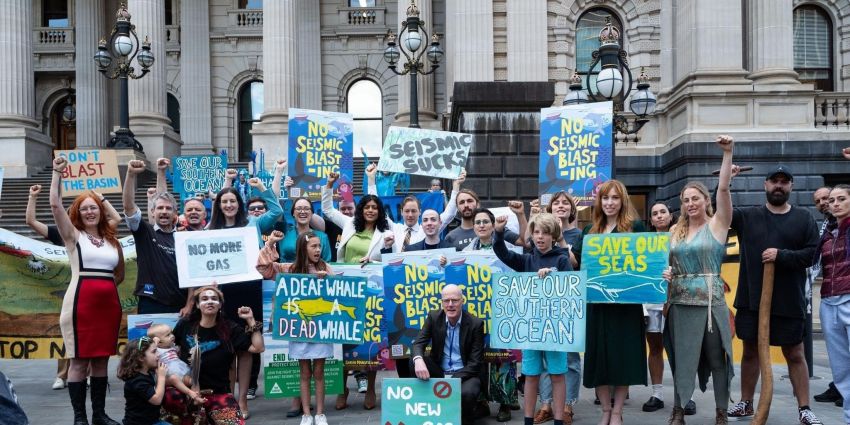
Community, environmental and First Nations groups are breathing a sigh of relief that their years of campaigning to protect marine life has forced multinational gas exploration company TGS to withdraw a plan to conduct the world’s largest seismic blasting project in the Southern Ocean, off the coast of south-west Victoria.
NOPSEMA received more than 30,000 public submissions about the TGS-SLB plan, with communities fighting hard to save sacred southern Sea Country and the Koontapool songline.
Australian Marine Conservation Society oil and gas campaign manager Louise Morris said Australians had rejected the proposal.
Surfrider Foundation Australia’s National Campaigns Director, Drew McPherson said it “put risk everything we care about — healthy clean oceans, thriving coastal communities and threatened species of whales and marine life”.
TGS was not able to meet the environmental protection and mitigation requirements for such a dangerous project, he said. “It’s clear to us that TGS withdrew because they couldn’t meet these already low standards.”
TGS withdrew its environmental application to industry regulator NOPSEMA on September 26 citing “competing global priorities”.
It had plans to blast more than 7 million hectares of ocean off the coast of Victoria, South Australia and Tasmania.
Significant concern over the lack of public consultation and the environmental impact of the blasts delayed the approvals process and reduced the blast scope to 3.17 million hectares.
Seismic blasting is the first step in offshore oil and gas production.
Seismic vessels would have fired air gun blasts every 10 seconds, 24 hours a day, for up to 400 days in the Southern Ocean. The underwater blasts reach up to 250 decibels, louder than an atomic bomb.
TGS first announced its blasting proposal in 2022. It wanted to cover 7.7 million hectares of the Southern Ocean, stretching past the South Australian border. Community opposition forced it to reduce the area to 3.17 million hectares.
It would still have endangered marine life, commercial fisheries and ecosystems, including blue whale habitat.
An alliance of community, environmental, scientific and First Nations groups sent more than 10,000 letters to MPs and 1200 locals paddled out in protest in March in Torquay.
A touring documentary highlighted the devastating impacts of seismic blasting, and delegations to meet MPs in Canberra.
McPherson said the practice needs to be “banned forever so we don’t have to keep fighting off individual permits”.
“We don’t have a gas supply problem; we have a gas export problem,” he said, a reference to Australia’s gas exports. “The gas industry is mostly multinational, and pays basically no tax … and little in royalties.
“To continue to allow them to expand into pristine marine ecosystems, in the middle of the climate crisis, is madness.”
Surf Coast Surfrider Branch Secretary and volunteer Darren Noyes-Brown said: “My community of Torquay had everything to lose if this went ahead as it became clear TGS wasn’t able to meet even the basic requirements that would mitigate the impacts of seismic blasting.
“It’s time we think about permanently protecting pristine places like the Great Ocean Road and the Southern Ocean so our kids don’t have to put up the same fight.”
The community alliance included Surfrider Foundation Australia, Save the Southern Sea, OCEAN, Friends of the Earth and Australian Marine Conservation Society as well as First Nations group Southern Ocean Protection Embassy Collective.
In their celebration post, the Gunditjmara said they have “already had enough taken away” though the continuation of the genocide, from the first boats to today. They will remain focused on protecting all marine life, and “there’s not a thing any gas company or government can do to stop us”.
The AMCS warns that the fight to protect our oceans is not over. “Special Prospecting Authority (SPA) permits are still allowing companies to bypass vital protections and carry out seismic blasting in endangered whale habitats.
“Seismic data company CGG has a proposal on the table right now to carry out seismic blasting right next to endangered southern right whale calving grounds. We need to abolish these cheap, dodgy SPA permits once and for all, and continue to stop these projects before they can start.”
[Sign the petition to stop seismic blasts for good.]